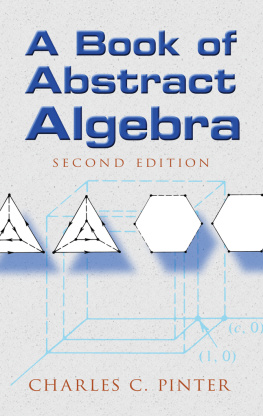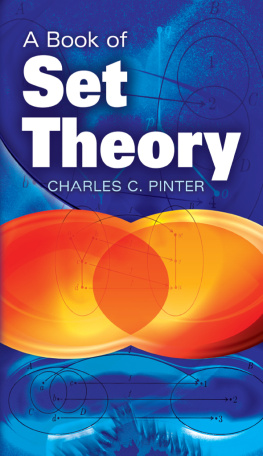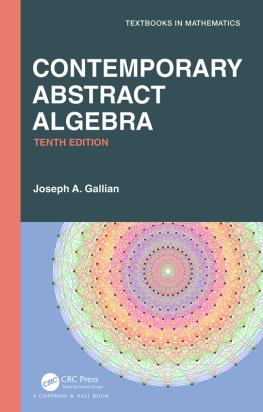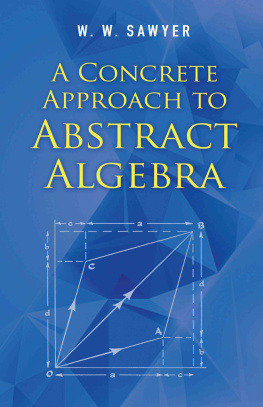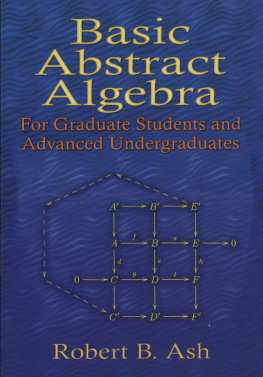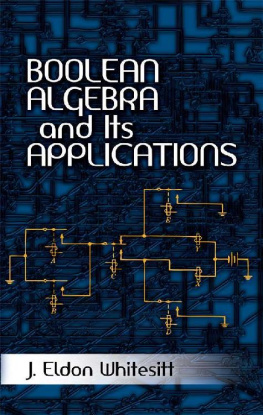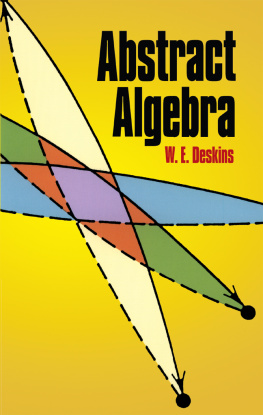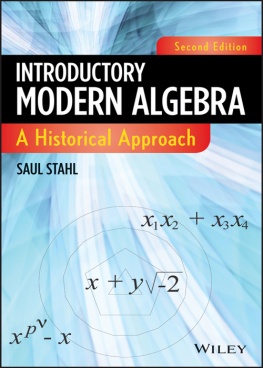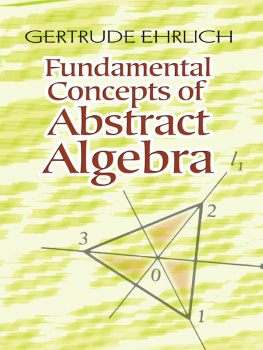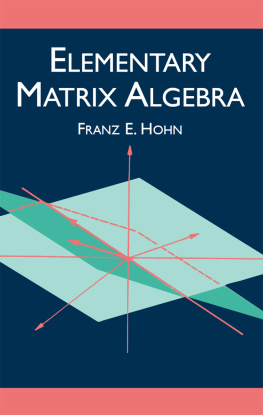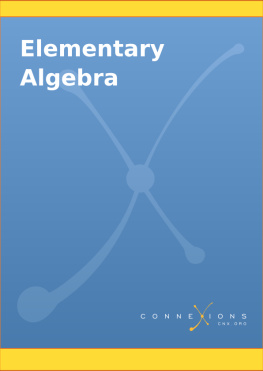A BOOK OF
ABSTRACT ALGEBRA
Second Edition
Charles C. Pinter
Professor of Mathematics
Bucknell University
Dover Publications, Inc., Mineola, New York
Copyright
Copyright 1982, 1990 by Charles C. Pinter
All rights reserved.
Bibliographical Note
This Dover edition, first published in 2010, is an unabridged republication of the 1990 second edition of the work originally published in 1982 by the McGraw-Hill Publishing Company, Inc., New York.
Library of Congress Cataloging-in-Publication Data
Pinter, Charles C, 1932
A book of abstract algebra / Charles C. Pinter. Dover ed.
p. cm.
Originally published: 2nd ed. New York : McGraw-Hill, 1990.
Includes bibliographical references and index.
ISBN-13: 978-0-486-47417-5
ISBN-10: 0-486-47417-8
1. Algebra, Abstract. I. Title.
QA162.P56 2010
512.02dc22
2009026228
Manufactured in the United States by Courier Corporation
47417803
www.doverpublications.com
To my wife, Donna,
and my sons,
Nicholas, Marco,
Andrs, and Adrian
PREFACE
Once, when I was a student struggling to understand modern algebra, I was told to view this subject as an intellectual chess game, with conventional moves and prescribed rules of play. I was ill served by this bit of extemporaneous advice, and vowed never to perpetuate the falsehood that mathematics is purelyor primarilya formalism. My pledge has strongly influenced the shape and style of this book.
While giving due emphasis to the deductive aspect of modern algebra, I have endeavored here to present modern algebra as a lively branch of mathematics, having considerable imaginative appeal and resting on some firm, clear, and familiar intuitions. I have devoted a great deal of attention to bringing out the meaningfulness of algebraic concepts, by tracing these concepts to their origins in classical algebra and at the same time exploring their connections with other parts of mathematics, especially geometry, number theory, and aspects of computation and equation solving.
In an introductory chapter entitled Why Abstract Algebra?, as well as in numerous historical asides, concepts of abstract algebra are traced to the historic context in which they arose. I have attempted to show that they arose without artifice, as a natural response to particular needs, in the course of a natural process of evolution. Furthermore, I have endeavored to bring to light, explicitly, the intuitive content of the algebraic concepts used in this book. Concepts are more meaningful to students when the students are able to represent those concepts in their minds by clear and familiar mental images. Accordingly, the process of concrete concept-formation is developed with care throughout this book.
I have deliberately avoided a rigid conventional format, with its succession of definition, theorem, proof, corollary, example. In my experience, that kind of format encourages some students to believe that mathematical concepts have a merely conventional character, and may encourage rote memorization. Instead, each chapter has the form of a discussion with the student, with the accent on explaining and motivating.
In an effort to avoid fragmentation of the subject matter into loosely related definitions and results, each chapter is built around a central theme and remains anchored to this focal point. In the later chapters especially, this focal point is a specific application or use. Details of every topic are then woven into the general discussion, so as to keep a natural flow of ideas running through each chapter.
The arrangement of topics is designed to avoid tedious proofs and long-winded explanations. Routine arguments are worked into the discussion whenever this seems natural and appropriate, and proofs to theorems are seldom more than a few lines long. (There are, of course, a few exceptions to this.) Elementary background material is filled in as it is needed. For example, a brief chapter on functions precedes the discussion of permutation groups, and a chapter on equivalence relations and partitions paves the way for Lagranges theorem.
This book addresses itself especially to the average student, to enable him or her to learn and understand as much algebra as possible. In scope and subject-matter coverage, it is no different from many other standard texts. It begins with the promise of demonstrating the unsolvability of the quintic and ends with that promise fulfilled. Standard topics are discussed in their usual order, and many advanced and peripheral subjects are introduced in the exercises, accompanied by ample instruction and commentary.
I have included a copious supply of exercisesprobably more exercises than in other books at this level. They are designed to offer a wide range of experiences to students at different levels of ability. There is some novelty in the way the exercises are organized: at the end of each chapter, the exercises are grouped into exercise sets, each set containing about six to eight exercises and headed by a descriptive title. Each set touches upon an idea or skill covered in the chapter.
The first few exercise sets in each chapter contain problems which are essentially computational or manipulative. Then, there are two or three sets of simple proof-type questions, which require mainly the ability to put together definitions and results with understanding of their meaning. After that, I have endeavored to make the exercises more interesting by arranging them so that in each set a new result is proved, or new light is shed on the subject of the chapter.
As a rule, all the exercises have the same weight: very simple exercises are grouped together as parts of a single problem, and conversely, problems which require a complex argument are broken into several subproblems which the student may tackle in turn. I have selected mainly problems which have intrinsic relevance, and are not merely drill, on the premise that this is much more satisfying to the student.
CHANGES IN THE SECOND EDITION
During the seven years that have elapsed since publication of the first edition of A Book of Abstract Algebra, I have received letters from many readers with comments and suggestions. Moreover, a number of reviewers have gone over the text with the aim of finding ways to increase its effectiveness and appeal as a teaching tool. In preparing the second edition, I have taken account of the many suggestions that were made, and of my own experience with the book in my classes.
In addition to numerous small changes that should make the book easier to read, the following major changes should be noted:
EXERCISES Many of the exercises have been refined or rewordedand a few of the exercise sets reorganizedin order to enhance their clarity or, in some cases, to make them more mathematically interesting. In addition, several new exericse sets have been included which touch upon applications of algebra and are discussed next:
APPLICATIONS The question of including applications of abstract algebra in an undergraduate course (especially a one-semester course) is a touchy one. Either one runs the risk of making a visibly weak case for the applicability of the notions of abstract algebra, or on the other handby including substantive applicationsone may end up having to omit a lot of important algebra. I have adopted what I believe is a reasonable compromise by adding an elementary discussion of a few application areas (chiefly aspects of coding and automata theory) only in the exercise sections, in connection with specific exercise. These exercises may be either stressed, de-emphasized, or omitted altogether.

